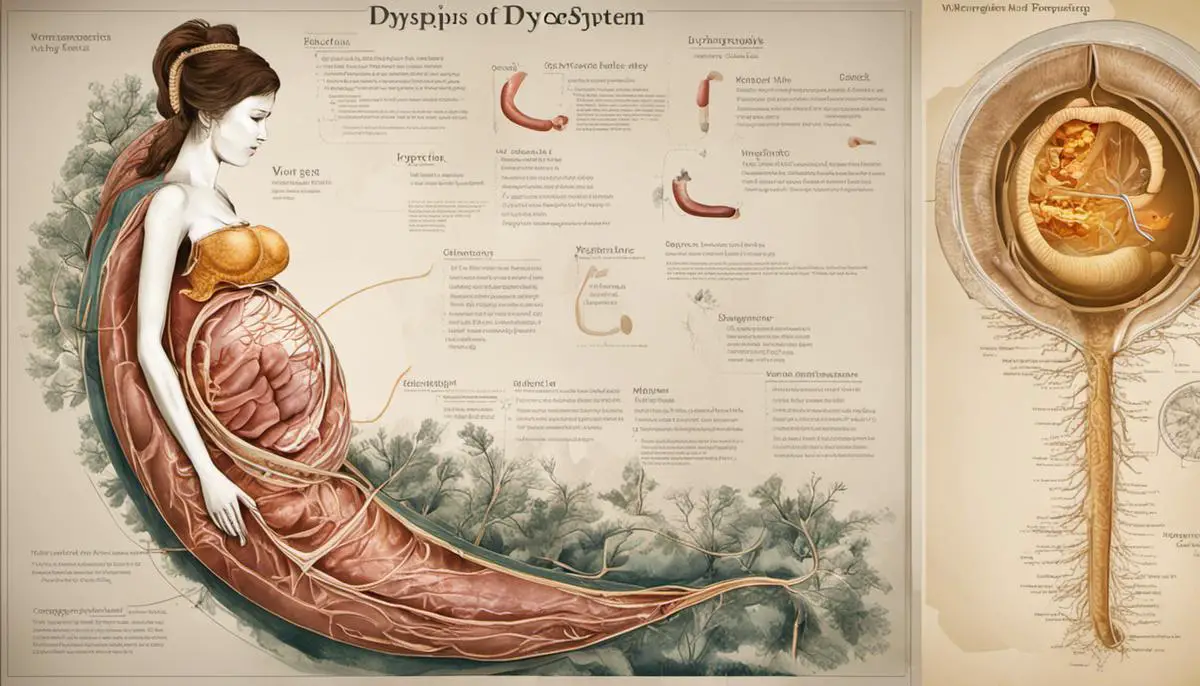Dyspepsia, often referred to as indigestion, is a condition that can affect many people, but it is particularly pronounced in pregnant women. Understanding the intricacies of this discomforting condition is not just vital to healthcare professionals, but also to those experiencing it, especially expectant mothers. With symptoms ranging from consistent discomfort in the upper abdomen to nausea, bloating, and heartburn, it’s essential to understand what triggers this condition and how it can be managed effectively. This piece sheds light on dyspepsia, its causes, symptoms, diagnosis, and treatment methodologies, especially during pregnancy. By anchoring the layperson’s interest in science and overall health, this piece seeks to unravel the intricacies and complications of dyspepsia during pregnancy.
Understanding Dyspepsia: What it is?
Understanding Dyspepsia: What it is?
Dyspepsia, frequently referred to as indigestion, is a term that refers to a range of symptoms related to the digestive system. Originating from the Greek word “dyspepsis”, it loosely translates to “bad digestion”. The condition is not a disease per se, but rather a collection of very common symptoms that most people experiences at some point. The broad category of dyspepsia includes discomfort or a burning sensation in the upper abdomen, bloating, belching, nausea, and sometimes vomiting.
Dyspepsia can be categorized into two types—organic and functional. Organic dyspepsia is when the physical abnormalities in the body are the culprits, such as ulcers or cancer. However, functional or non-ulcer dyspepsia, the most common type, holds no apparent organic cause, which makes it hard to diagnose or pinpoint the exact reasons.
Dyspepsia during Pregnancy
When it comes to pregnancy, dyspepsia is not an uncommon phenomenon. Up to 80% of pregnant women experience dyspepsia at some point during their pregnancy. Pregnancy hormones, especially progesterone, play a significant role in causing symptoms of indigestion. These hormones tend to relax the smooth muscle tissue throughout your body, including your gastrointestinal tract. This relaxation slows your digestive processes, leading to bloating, belching, and discomfort.
Moreover, as the pregnancy progresses, the growing baby exerts more and more pressure on the stomach and other digestive organs, which can exacerbate these symptoms. Because of these unique challenges, dyspepsia during pregnancy requires particular understanding and management.
An Overview of Dyspepsia’s Impact
Dyspepsia, commonly known as indigestion, often results in severe discomfort, particularly after eating. It slows the process of digestion, causing food to remain in the stomach longer than normal. Hence, even a small meal might result in an uncomfortable feeling of fullness, and the individual might become more prone to feelings of nausea or vomiting.
While dyspepsia is accompanied by discomfort, it doesn’t usually lead to severe complications. Nonetheless, it could act as an indicator of a more serious underlying health issue. Thus, it’s essential to consult with a healthcare provider if symptoms of dyspepsia persist or worsen. Dyspepsia can substantiality affect an individual’s life quality. It’s especially crucial to manage this condition during pregnancy, where sufficient eating is key for the wellbeing of both mother and baby.

Dyspepsia During Pregnancy: Causes
Understanding Dyspepsia in Pregnancy: Potential Causes and Factors
Dyspepsia, or indigestion, is a common concern amongst pregnant women. Pregnancy involves physical and hormonal shifts, which might trigger or exacerbate dyspepsia. Besides these physiological changes, other elements such as lifestyle choices, dietary habits, stress levels, and anxiety can significantly contribute to the condition.
Hormonal Changes and Physical Shifts
During pregnancy, the body undergoes a significant hormonal shift, one of the major players being progesterone. This hormone relaxes the muscles in the body, including the stomach and intestines, slowing down digestion. A slower digestion rate results in food staying in the stomach longer, which can cause heartburn, bloating, and discomfort, the classic symptoms of dyspepsia.
Additionally, as the pregnancy progresses, the increasing size of the uterus presses against the stomach, forcing stomach acid upward into the esophagus. This physical change can exacerbate symptoms of indigestion and heighten the discomfort experienced by an expectant mother.
Diet and Lifestyle Influences
Dietary choices can significantly influence the occurrence and severity of dyspepsia during pregnancy. Heavy, greasy or spicy foods are more challenging to digest. Therefore, they might increase the risk of developing dyspepsia. Similarly, large meals put additional pressure on the stomach and can trigger indigestion.
Lifestyle factors, such as smoking and consumption of alcohol, also increase the risk of experiencing dyspepsia in pregnancy. These habits can cause the valve between the stomach and esophagus to relax, leading to a reflux of stomach acid.
Role of Stress and Anxiety
Stress and anxiety are often overlooked, yet they play a significant role when it comes to dyspepsia during pregnancy. Pregnancy, while being a time of joy and expectation, can also be a period of added stress and anxiety due to numerous changes occurring both physically and emotionally. The brain and the gastrointestinal system are strongly linked – stress can result in physical discomfort, including digestive issues like dyspepsia. This connection explains why some women may experience an exacerbation of indigestion symptoms during times of heightened stress or anxiety.
Navigating dyspepsia during pregnancy can be made easier by understanding some key factors. Modifying eating habits, handling stress effectively, and maintaining regular medical check-ups are methods that can substantially alleviate the signs and symptoms. However, it’s vitally important for any ongoing or severe symptoms to be communicated to a healthcare professional to ensure accurate diagnosis and treatment.

Signs and Symptoms of Dyspepsia in Pregnancy
Identifying the Signs and Symptoms of Pregnancy-Related Dyspepsia
Known more commonly as indigestion, dyspepsia is a condition that often affects expectant mothers. Typically characterized by an uneasy or burning sensation in the upper part of the stomach, its symptoms can greatly vary. While some pregnant women might only encounter mild discomfort, others may face more severe and impairing symptoms. Getting familiar with the broad spectrum of symptoms linked to dyspepsia during pregnancy can aid in its early identification and subsequent management.
Feeling of Fullness
One of the most common symptoms of dyspepsia in pregnancy is a persistent feeling of fullness. This usually happens during or immediately after meals and can last for several hours. This feeling can occur even when one has not eaten a sizeable meal and is often accompanied by bloating.
Nausea and Vomiting
Nausea and vomiting are other common symptoms experienced by pregnant women suffering from dyspepsia. Nausea is usually more common in mornings, but it can occur at any time of the day or night. Severe or recurrent nausea may cause difficulty maintaining a balanced diet and consuming adequate nutrients.
Heartburn
Heartburn is another frequently reported complaint in dyspeptic pregnant women. It is characterized as a burning sensation that starts from the stomach or lower chest and ascends up to the throat. This uncomfortable sensation is typically triggered by certain foods or lying down after meals.
Constant Discomfort in the Upper Abdomen
A lesser-known but significant symptom of dyspepsia in pregnancy is a constant discomfort in the upper abdomen. The discomfort can feel like a sharp pain, stitch, or a general ache. It usually arises around the area of the stomach or lower chest area. Severe abdominal discomfort warrants immediate medical attention, as it may be indicative of an ulcer or severe gastritis.
Belching or Burping
Some pregnant women may also experience belching or burping frequently. While this is a common occurrence during pregnancy because of the slowed digestive process and hormonal changes, an increased frequency can be a sign of dyspepsia.
Changes in Bowel Habits
Last but not least, changes in bowel habits, such as constipation or diarrhea, can also accompany dyspepsia in some cases, adding to discomfort. Pregnant women should closely monitor such changes, as they may indicate something problematic like dyspepsia.
Understanding Key Symptoms
The symptoms of dyspepsia during pregnancy can present in different ways among different individuals, making it important to familiarize yourself with the most common signs. It’s crucial to understand that these symptoms can also coincide with other health conditions or standard bodily changes due to pregnancy. Recognizing what could potentially be symptoms of dyspepsia gives pregnant women an edge in identifying possible dyspepsia, thus enabling them to discuss it promptly with their healthcare provider. Persistent or severe symptoms should never be ignored, as professional medical assistance may be required promptly.

Diagnosis and Treatment for Dyspepsia During Pregnancy
Identifying Dyspepsia During Pregnancy
Diagnosing dyspepsia during pregnancy generally involves taking a thorough medical history, performing a physical examination, and occasionally, implementing additional diagnostic procedures. An accurate diagnosis is reliant upon a comprehensive symptom evaluation by the attending physician. Common dyspepsia symptoms such as bloating, abdominal discomfort, excessive burping, and nausea are taken into consideration. Distinguishing between these symptoms and the usual discomforts of pregnancy is vital in the diagnosis procedure.
Possible tests for the diagnosis might include an endoscopy that allows for a detailed view of the esophagus and stomach via a small tube with a camera. If necessary, a urea breath test may be administered to identify the presence of the Helicobacter pylori bacterium, which could exacerbate dyspepsia symptoms by causing ulcers. Blood tests may also be performed to rule out the condition of anemia and other medical conditions. However, such diagnostic tests are generally ordered only if the symptoms persist or worsen despite initial treatment efforts.
Treatment for Dyspepsia During Pregnancy
When it comes to treating dyspepsia during pregnancy, health professionals usually recommend a multi-faceted approach that includes lifestyle changes, diet modifications, over-the-counter medications, and occasionally, prescription drugs.
Making lifestyle changes is typically the first step in treating dyspepsia. Pregnant women might be advised to eat smaller and more frequent meals, avoid spicy or greasy food, and refrain from lying down soon after eating. Additionally, stress management techniques, such as yoga or meditation, might help alleviate symptoms by reducing overall stress levels.
Over-the-counter drugs such as antacids, H2 blockers, and proton pump inhibitors can often provide symptomatic relief from indigestion. Antacids are usually the first line of defense. They work by neutralizing stomach acid to relieve heartburn and indigestion. H2 blockers and proton pump inhibitors, which decrease acid production, may be recommended for more severe or persistent cases.
For severe or persistent dyspepsia during pregnancy, prescription medications may be necessary. Again, the choice of drug should be guided by the symptom profile, severity, and patient preference, always considering the potential risks and benefits to both the mother and fetus.
Home remedies and lifestyle changes
Several home remedies might also provide relief from dyspepsia during pregnancy. Acidic beverages like apple cider vinegar mixed with water sometimes help reduce symptoms, as can drinking herbal teas such as ginger or chamomile tea. Chewing gum can also stimulate saliva production, helping to neutralize stomach acid.
Regular physical activity, such as walking or prenatal yoga, can aid digestion and alleviate symptoms. Strengthening the muscles surrounding the abdomen can also play a role in supporting the gastrointestinal tract and reducing the pressure on the stomach.
Managing dyspepsia during pregnancy necessitates an individualized approach that considers the unique needs and circumstances of each pregnant woman. Prioritizing the health of the expectant mother and unborn child is paramount. Dyspepsia can be controlled via a mix of lifestyle changes, readily available over-the-counter remedies, and, in acute cases, prescribed medications. This strategy enables expecting mothers to maintain a high quality of life throughout their pregnancy.

Prevention of Dyspepsia During Pregnancy
Comprehending Pregnancy-Related Dyspepsia
Dyspepsia, otherwise known as indigestion, is frequently encountered by women during pregnancy. Typically, it presents as an uncomfortable feeling of fullness in the upper belly. Symptoms that pregnant women commonly associate with dyspepsia include bloating, acid reflux, feelings of nausea, and episodes of burping. The onset of dyspepsia during pregnancy can be attributed to hormonal shifts that induce muscle relaxation in the digestive tract, as well as the enlarged uterus exerting pressure on the stomach.
Dietary Suggestions for Preventing Dyspepsia
One of the primary ways to manage dyspepsia during pregnancy is through dietary considerations. It’s best to eat smaller, more frequent meals instead of three large ones to avoid overwhelming the digestive system. Consuming food slowly and chewing thoroughly can also help with better digestion.
Avoid foods that are high in fat, as they take longer to digest and can exacerbate symptoms. Also, spicy and acidic foods, caffeinated or carbonated beverages should also be avoided as they can trigger or worsen dyspepsia. Instead, focus on including whole foods, lean proteins, and fiber-rich fruits and vegetables in the diet.
Lifestyle Modifications to Prevent Dyspepsia
Certain lifestyle modifications can reduce the onset of dyspepsia during pregnancy. Drinking water regularly can help facilitate digestion but try avoiding drinking large amounts during meals as it could dilute stomach acids and hinder digestion.
Avoid lying down or going to bed immediately after a meal; allow at least two hours for food digestion. Maintaining an upright position, even while sleeping, can prevent the backflow of stomach acid into the esophagus, thereby reducing heartburn symptoms.
Exercise, such as walking after meals, can also assist in digestion and prevent dyspepsia. However, ensure exercises are moderate and suitable for pregnancy, avoiding anything strenuous.
Significance of Regular Prenatal Checkups
Regular prenatal checkups play an essential role in managing dyspepsia during pregnancy. These checkups allow healthcare providers to monitor the health of both the mother and baby, identify any complications early, and adjust the care plan as necessary.
If symptoms of dyspepsia persist or worsen despite dietary and lifestyle changes, it’s essential to relay this information to a healthcare provider during these checkups. In some cases, medication may be recommended to alleviate symptoms.
Pregnant women should keep in mind that while dyspepsia can be an uncomfortable side effect of pregnancy, most often it is temporary and does not pose a significant risk to their health or that of their baby when managed effectively.

The journey of pregnancy can be overwhelming, with the body undergoing numerous changes, some of which may lead to conditions like dyspepsia or indigestion. Prevention of dyspepsia, to the extent possible, is essential in ensuring a comfortable pregnancy journey. Simple dietary suggestions, regular exercise, regular prenatal check-ups and lifestyle modifications can go a long way to mitigate the effects of dyspepsia. Nonetheless, medical intervention is essential in severe cases. It is hoped that this piece assists individuals, particularly expectant women, on their journey towards understanding dyspepsia. Accurate knowledge of causes, symptoms, treatment, and prevention strategies can help ensure improved comfort and health both for the mother and the unborn child.
